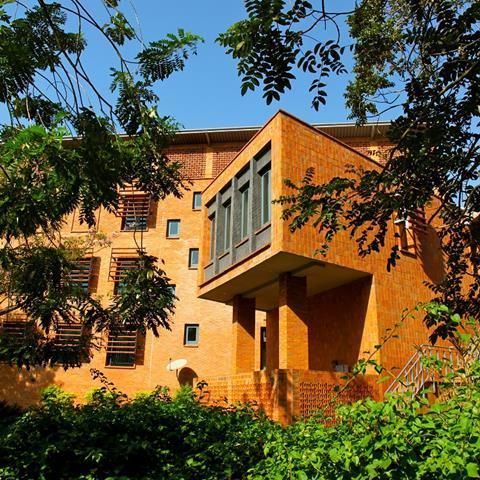Engaging with emerging markets may have its risks but it might provide architects with a post-Brexit boost, argues Ben Flatman

There has been a lot of talk since the EU referendum on how to build a ‘global Britain’, in which businesses seek out and develop new export markets. This begs the question as to why British firms weren’t doing more of this already. Liam Fox, the Secretary of State for International Trade has one answer, describing UK businesses as “too lazy and too fat” and claiming that British managers choose not to bother “because it might be too difficult or too time-consuming or because they can’t play golf on a Friday afternoon.”
Meanwhile, German exports are worth almost three times as much as those of the UK. France also exports more than Britain and is home to the world’s largest construction firm, VINCI. Even the Netherlands, despite having a population a third of the size, outperforms the UK in exports. All three countries have achieved this as core members of the EU and Euro. So what’s been holding UK business back?
In contrast to manufacturing, British architectural firms are actually already amongst the global export leaders, and have a well-established presence in many of the world’s most developed markets. But what about those emerging and underdeveloped markets, where the risks are significantly higher?
German exports are worth almost three times as much as those of the UK. So what’s been holding UK business back?
I recently visited a British architectural firm in Uganda, who have been operating in East Africa for more than 20 years. FBW are a multidisciplinary firm of architects and engineers. The founding directors were British and Dutch, and although the practice retains a presence in the Netherlands, it’s incorporated in the UK. It’s perhaps a model of what Liam Fox and Theresa May would like British businesses to be doing. But FBW established itself in Africa 20 years ago, and has grown and thrived there despite, or perhaps because of the UK’s key place within the EU.

Paul Moores is FBW’s Group Managing Director. He was invited to set up FBW’s Ugandan office in 1998. He’s a Mancunian, and studied architecture in Liverpool in the 1980s. Made redundant during his year out, he developed an early appreciation of the fickle nature of the UK architectural profession. Partly out of a sense of adventure but also out of necessity, he made the move to Africa and hasn’t looked back.
With satellite offices in Rwanda and Kenya, FBW has developed a leading role in the local market, with a significant portion of their workload coming from servicing EU clients looking to invest in Africa. FBW provide international standards of consultancy, and much sought after local knowledge in terms of building standards and contractors’ capabilities. Projects include schools, offices and housing, including both high-end and affordable.
In contrast to manufacturing, British architectural firms are actually already amongst the global export leaders.
As well as directly servicing a range of private sector and NGO clients, FBW has also become one of the go-to partners in the region for international consultants looking for on-the-ground expertise. They’ve regularly worked and bid together with Turner & Townsend and Mott Macdonald, helping provide the kind of local market knowledge that can make the difference between success and failure in a particularly challenging region.
Moores is also proud of the role the firm has played in developing Ugandan capacity. He estimates that perhaps 10 per cent of the country’s architectural profession has worked for FBW at some point. And according to Moores, the firm has also helped reinvigorate largely forgotten skills in clay and stonework. For the RIBA award-winning British High Commission in Kampala, the design team of Cullum & Nightingale and FBW worked with a specialist contractor to achieve multiple brick specials. The cost in the UK would have been prohibitive, but in Uganda, the skills were affordable and simply waiting to be put to good use.

Moores currently sees no sign of British businesses rushing to establish themselves on the ground in East Africa, despite it being a region where British firms were once dominant. As he observes, businesses need a high risk appetite to succeed in Africa. By implication, this is something that appears to be largely lacking amongst other UK firms.
Businesses need a high risk appetite to succeed in Africa… this is something that appears to be largely lacking amongst UK firms.
One of the current ironies of the UK’s diplomatic stance in East Africa is that the British government has long been a strong advocate of regional integration. The East African Community, which has made great progress towards improving free trade between the region’s leading economies, is actually largely modelled on the EU. This is just as the UK itself is about to break away from the world’s largest and most integrated regional economy, the EU’s single market.
Moores points to the EAC’s Mutual Recognition Agreement, similar to the EU’s professional qualifications directives, as hugely significant in terms of making it easier for FBW to do business across borders in what are otherwise highly regulated and restricted markets. Once registered in Uganda, Kenya or Rwanda, architects are able to work freely in any of the other countries. Similar professional recognition for UK architects working in or bidding for work in the EU may soon be lost due to Brexit.
Noting that many of FBW’s clients come from across the EU, he even speculates that if Brexit damages those client relationships, FBW’s parent company might need to reinvigorate its own historical links with the Netherlands. So what does Moores, a British architect who went to Africa and helped set up a successful British export business there, think of Brexit? “Well, it’s madness, isn’t it?” is his succinct answer.
Postscript
Pictures by John Gibbons
















2 Readers' comments